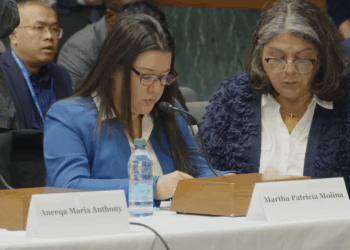Andrew Gilligan is a writer and former No10 adviser.
As Danny Kruger, Reform’s new policy chief, presents his plans for Whitehall today, here is one generalisation: During the last government, the only major new policy initiatives which worked were those where we brought in outsiders – where the civil service did not have the lead role.
I can think of some exceptions.
And some parts of the British state which are run by civil servants have shown themselves capable of improvement. I’ll cover the lessons from one of those, the passport service, in a future column.
But the Cameron government’s biggest success, schools reform, was driven in part by the growth of free schools – something led not by Whitehall but by a specially-established charity, the New Schools Network. The Johnson government’s greatest triumph, the vaccine taskforce, was led not by civil servants but a venture capitalist, Kate Bingham.
On a far smaller scale, in London, the swift delivery of Britain’s best and most heavily-used bike lanes, along with dozens of protected junctions, mandatory new safety equipment on lorries and some major improvements in the suburbs, was led by a journalist with no previous government experience – me.
(I know many Tories won’t see this as a success, but it was. Cyclist numbers in London have roughly doubled since this work was done, while cyclist deaths have fallen by about a third. On the most controversial bit, the Victoria Embankment, the bike lane, which takes up a quarter of the road surface, is now carrying more traffic than the rest of the road put together – a template answer to the problem of limited road space in our big cities.)
None of this shows officials are unnecessary or can be swept aside. I’d never claim sole credit for the bike stuff– it was the work of dozens of people, officials and traffic experts at TfL with skills I don’t have. The vaccine taskforce included civil servants as well as entrepreneurs and scientists.
But my experience, in London and in Downing Street, was that officials on their own aren’t enough to do anything properly, even supposing (not always a given) that they want to. You need not just political leadership, but political people to drive and manage programmes. Strong ministers, with a firm idea of what they want to do, kept in post for a long time, are vital, but nor are they enough. They can’t hope to grip all the detail on everything. Anyway, the talent pool for ministers, largely a few hundred members of the Commons, is small.
So one of my quick fixes for Whitehall is hundreds more special advisers, perhaps 30 for each department, six to ten times the current number, dedicated to individual policy areas and focused on delivery. As a SpAd, I had no actual power but a fair amount of influence, and I did manage to advance the PM’s policy agenda in some areas. But there was only one of me, along with one or two others in the department, and I could only focus on a few issues before gravity took hold on Boris Johnson.
The new SpAds would be a mixture of the current young ex-party HQ types – still needed for the physical demands of the work – and tough-minded older folk with life, implementation and subject matter experience. That is how the SpAd trade was at the beginning: as health secretary, Barbara Castle had a young Jack Straw for the politics and a middle-aged socialist academic, Professor Brian Abel-Smith, for the policy. If you could recruit genuine experts who are in sympathy with your objectives, it might save rather a lot of time in argument and bad policy design.
It would be harder for bureaucratic obstruction to see off, say, Dieter Helm than some bright 25-year-old out of CRD. If you’d had ten or fifteen top-rank people constantly across every detail of the Home Office’s immigration system, rather than perhaps half to one top-rank person jumping in and out, depending on what fires had to be fought elsewhere, it might have made a difference. And, dare I say it, journalists are better as policy SpAds than the media SpAds they usually end up as – we’re good at asking questions, absorbing evidence, disrespecting authority and challenging groupthink.
The SpAd corps would be the heart of a wider group of political appointees for the quangos and institutions, with a database of people ready to be deployed. At least some spads should be able to direct civil servants. But it wouldn’t be as big a politicisation as America’s: non-political officials would still be perhaps 90 per cent of the policy ranks.
The federal government of Australia, another parliamentary-system country, has about four times more special advisers than the UK, even with a population less than half the size, powerful states and a political centre with a far smaller role than Britain’s. And it may also be better governed: its economy has certainly done better, and its politics hasn’t fractured like ours has.
One of the many, many mistakes of the Cameron-Osborne era was to set limits on the number of special advisers, imagining as they did that voters even noticed, let alone cared. Their No10 policy unit had no SpAds at all to begin with, until they realised it meant they hadn’t spotted the political calamity of the Lansley NHS reforms.
The problem, perhaps, is where you get all your new recruits.
Left-wing talent is more interested in joining government. Right-wing talent would rather make money.
But spadding, done properly, could be a badly needed way of bringing new talent into politics. I respect those who take on the miseries of public office; the final decision maker should always be elected. But they are small and diminishing in number. For many who would be great in government, pinning themselves to the political dartboard will never be attractive. If you developed spadding as a proper career path, it might tempt them.
That would need more of a structure. Insecurity is inevitable in politics, but the insecurity of spadding is greater than any other political job. Even if you’re sacked as a minister, you’re still an MP until the next election. So mid-career people with families might need some kind of pay or job continuation guarantee as an incentive to take the risk. That will be controversial, but lots of what needs doing will be controversial. (Top people who have achieved financial security might just, perhaps, be easier.) It’ll need more training, up from precisely none at the moment, so you’re not just thrown in the pool and expected to be Michael Phelps. It’ll need a better recruitment process than “the guy who did the photocopying in my constituency office.”
You might arrange, if you could afford it, for your experts to start with you in opposition, working with the shadow ministers to draw up plans for every area that needs fixing, anticipating objections and difficulties and planning how to deal with them.
Sounds obvious, I know, but which government, including this one, has ever actually done that?








![Florida Officer Shot Twice in the Face During Service Call; Suspect Killed [WATCH]](https://www.right2024.com/wp-content/uploads/2025/12/Inmate-Escapes-Atlanta-Hospital-After-Suicide-Attempt-Steals-SUV-Handgun-350x250.jpg)

![Keith Ellison Caught Promising to Fight State Agencies for Somali Fraudsters [WATCH]](https://www.right2024.com/wp-content/uploads/2026/01/Keith-Ellison-Caught-Promising-to-Fight-State-Agencies-for-Somali-350x250.jpg)






